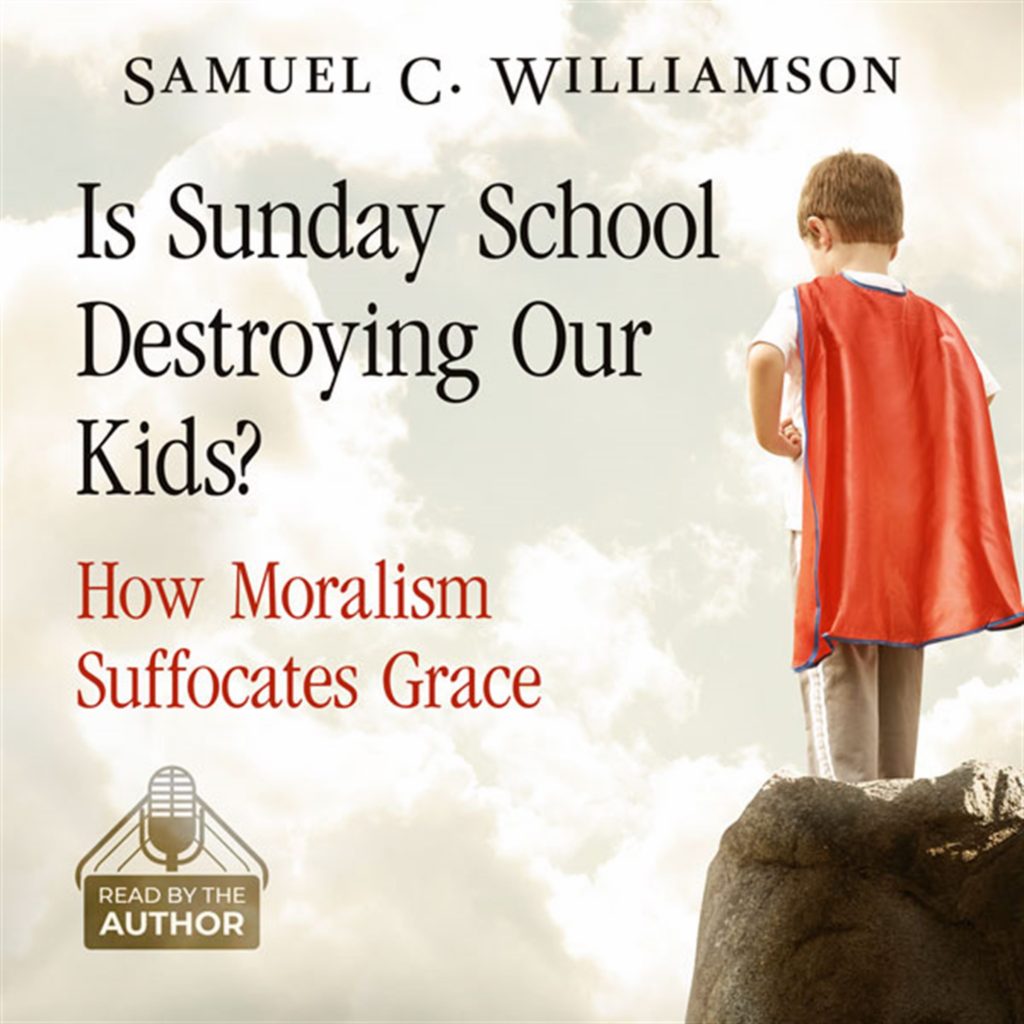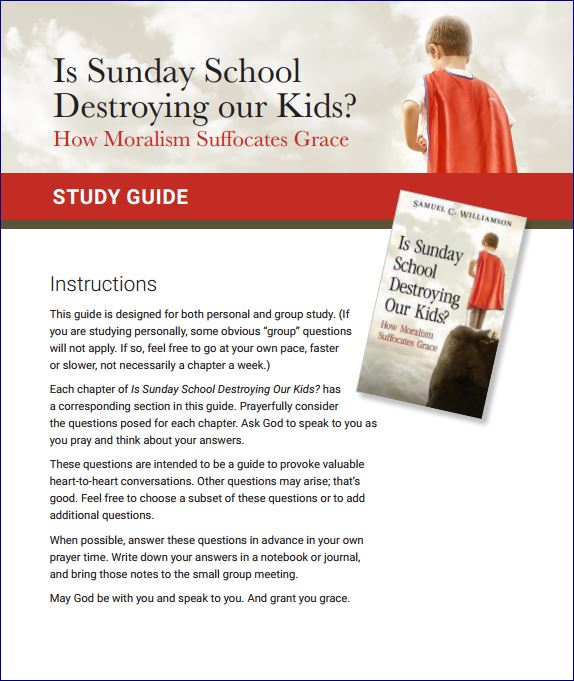
Several years ago I met with a woman distraught over her son’s rejection of Christianity.
She said, “I did everything I could to raise him right. I taught him to be like the ‘heroes of faith,’ with the faithfulness of Abraham, the goodness of Joseph, the pure heart of David, and the obedience of Esther.”
She wondered why he had rejected Christianity.
I wondered why it took him so long.
Here Is How We Destroy the Gospel Message
Look at almost any Sunday school curriculum and you’ll find the following:
- Abraham was faithful, and God made him the father of a nation. So be faithful like Abraham.
- Joseph was a good little boy (unlike his “bad” brothers), and God made him prime minister of Egypt. So be good like Joseph.
- David had a pure heart, and God made him king of Israel. So have a pure heart like David.
- Esther was an obedient girl. God made her queen of Persia, and she saved God’s people. So be obedient like Esther.
- Finally, if we fail to be good, Jesus will forgive us. (This comes as a PS tacked onto the end.)
What’s so bad about these Sunday school lessons?
Nothing really. Except that they lie about God, they lie about these “heroes of the faith,” they lie about the Bible, and they lie about the gospel. Oh, and they create “younger brother” rebels and “older brother” Pharisees. Apart from that, they are pretty good.
Is the gospel our central theme, or is it a PS tacked onto the end?
The Gospel Is More Than Good Morals
We need moral people. In a world where darkness expresses itself in everything from petty theft to genocide, healthy morals enable us to peacefully coexist. And that is good. Essential, even. It just isn’t the gospel.
In The Abolition of Man, C. S. Lewis shows how all the major religious thinkers share similar moral values. He quotes from ancient Egyptian, Babylonian, Hindu, Greek, and Jewish writings. Despite the wide gulfs of geography, time, and culture, there is an amazing consistency in moral wisdom concerning fidelity, honesty, mercy, and justice.
And that is the point: Most religions believe in mostly the same moralities. So what distinguishes Christianity? We need the gospel. And the gospel exceeds mere morality.
The Gospel Storyline
The message of the gospel—the entire storyline of Scripture—is God’s loving pursuit of people who run from him as fast as they can and who live lives unworthy of his love.
That’s why it’s called grace.
But too many Sunday school lessons teach us to be good little boys and girls, and if we are, then God will love us and use us. It’s the total opposite of the gospel. It’s a counterfeit of the worst kind.
The Inside Out of the Gospel
The wonder of the gospel is not the love of the beautiful; it’s that Beauty kisses the Beast. The Beast isn’t loved because he has already changed; the Beast is changed when he is loved. Joy doesn’t come when he’s loved for his beauty; joy overwhelms him when he is loved in his hideousness.
Besides, if the Beast were loved for his beauty, it would be an unbearable burden. Any day he might be scarred, and in any case he will soon be a wrinkled old man.
So why do we burden our children with the unbearable load of “being good little boys and girls like the heroes in the Bible”? We wouldn’t load a pack mule with the burdens we place on our children.
There’s Gotta Be a Better Way
Let’s teach the wonder of the gospel. Let’s show our kids that God loves us simply because he loves us. In our beastliness. That he loves us before we are good. That his love isn’t vague sentimentality but cost him his most precious treasure in order to turn us into his prized possession.
That the storyline of the Bible is God’s search-and-rescue mission to find the dying Beast and kiss him into joyous life. Grace doesn’t mean we choose to abandon morality; it simply acknowledges we already have and refuse to admit it. Let’s teach our kids how:
- Abraham was an idol worshiper, and God loved him and pursued him;
- Joseph was a narcissistic boy, and God loved him and pursued him;
- David was a murdering adulterer, and God loved him and pursued him; and
- Esther had sex outside of marriage with a non-believer, and God loved her and pursued her.
Our heroes weren’t loved because they were good; they became good because they were loved. We want to defend these heroes (I especially want to defend Esther though probably not David), but defending them (and ourselves) robs us of God’s great grace.
We may believe in the innocence of youth, but our children know better. They see the children in the schoolyard. And they see us at home. They don’t need the counterfeit gospel of pack-mule moralism. They need the kiss of the Beauty.
Maybe we do too.
Sam
++++++++++++++++++++++
THE AUDIOBOOK is now available: Buy Audiobook Here.
(This post contains material from my book, Is Sunday School Destroying Our Kids. )
The world needs morality–oppression thrives when consciences are abandoned–but we need more than morality alone. We need the gospel of grace. A gospel that has largely been lost amid the dos and don’ts and preoccupations of religious culture.
Join thousand of other readers who have delighted in this short, story-filled, thought-provoking book on grace.
[button href=”http://www.amazon.com/Sunday-School-Destroying-Our-Kids-ebook/dp/B00H5C7GB2/ref=sr_1_1?s=books&ie=UTF8&qid=1455706442&sr=1-1&keywords=is+sunday+school+destroying+our+kids” primary=”true” centered=”true” newwindow=”true”]Buy on Amazon now: Print, eBook, and Audiobook[/button]
A twelve week study guide is available, filled with questions for reflection and exercises for growth; perfect for small groups or personal meditation. To download free Study Guide, Click Here.
Click here for a PDF of commonly asked questions about this book: Frequently Asked Questions



 Does Prayer Work?
Does Prayer Work?
Amen!
Well I taught Sunday School,camps & VBS for years. The message was not “be good “ but Christ died for our sins and only through our faith in his saving Grace and relying on Him in His goodness continually could we ever be what He wants us to be.. Not of ourselves, not of works lest any man should boast.
I agree, Dorothy. This author is making invalid assumptions right from the start. I grew up going to Sunday school and have been a Sunday school teacher. I wasn’t taught nor did I teach what he says is being taught in Sunday school.
This is exactly what I was taught.